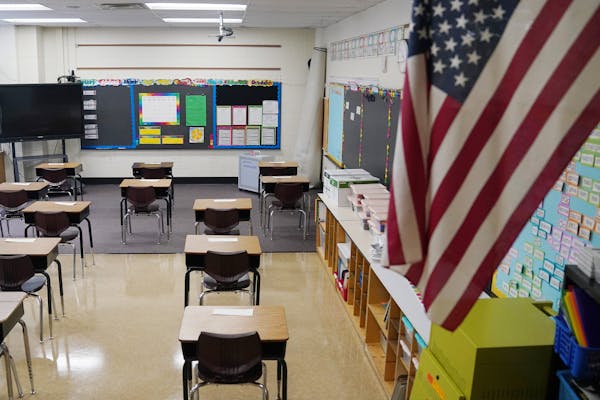Minnesota school districts would have to negotiate with teachers unions over class sizes, staffing ratios and testing policies under proposals in consideration by the Legislature.
Depending on who you ask, the measures would either grant unions an unfair advantage at the bargaining table or balance inequities in that process.
Such provisions are rare in labor agreements in the state. Class size was one of the issues that prompted Minneapolis teachers to strike last year, and an agreement over the issue helped avert a strike in St. Paul. Education Minnesota, the statewide teachers union and a big supporter of DFL politicians, is pushing for those discussions to be included in contract negotiations at a time when that party controls both the Legislature and the governor's office.
School boards and district administrators across the state are concerned about having such mandates in the bargaining process. They said the requirements may prolong negotiations and leave little room to adjust to shifting enrollment or considerations around closing a school building or redrawing boundaries.
"The school boards association, superintendents, when they saw this language, they struggled," said Sen. Jason Rarick of Pine City, the Republican lead on the Senate Education Finance Committee.
DFLers and Education Minnesota insist concerns over the proposals are overblown.
"It doesn't guarantee any outcomes. It only guarantees that we have the conversation," Education Minnesota President Denise Specht said.
Rep. Sydney Jordan, DFL-Minneapolis, agrees with the union's take, adding that class sizes have been a contentious issue districts have long refused to negotiate.
"I think we've seen the results of not having these subjects of bargaining in contracts," said Jordan, who sits on the House Education Finance Committee. "Educators are walking out because districts aren't negotiating on this."
Unions in Minneapolis and St. Paul secured limits on class sizes in their contracts last year, provisions that previously went in non-binding memos that acted as strong suggestions. In Minneapolis, that language helped end a three-week strike.
Kirk Schneidawind, executive director of the Minnesota School Boards Association, said school boards and administrator associations prefer that such conversations happen during meetings between district and union representatives outside of the contract negotiation process.
"There are already avenues through which the exclusive [union] rep can share things that need improvement," Schneidawind said.
Rarick said Republicans are concerned the legislation may have an outsized impact on rural districts, which may struggle to afford adding staff or classrooms if their student counts exceed the maximum in a union contract by one or two pupils.
The legislation's opponents are also concerned by provisions that make part-time, seasonal and other educators eligible for union membership. Specht argues those employees are among districts' lowest paid employees and shoulder an outsized burden in addressing students' most intense academic and behavioral needs.
"They deserve the ability to unionize," she wrote in a letter to lawmakers.
School board members, administrators and Republicans argue that contract negotiations should center on compensation, benefits and working conditions. Running the district and the way buildings are staffed, they say, should be the purview of the school board and administrators.
"School boards are in charge of budgets — setting them and making personnel decisions," Schneidawind said. "When it comes to managing the budget, they need as many tools in the toolbox."
DFLers and union leaders contend that staffing ratios and class sizes qualify as working conditions. And they say prospective educators have the right to know those things while on the job hunt.
"Educators are making choices about where they work," Specht said. "I think that what they want is some assurances of what the workplace is going to be."
She and Jordan also say the legislation would make that information accessible to parents, giving them a clearer picture of the academic support and one-on-one attention a school can provide.
"The current working conditions, as well as the current learning conditions in our schools, aren't working for anyone," Specht said, citing the state's downward spiraling rates of literacy and math proficiency.
Still, the legislation's opponents say they're concerned it targets elements of school operations that vary from year to year, which sometimes need a swift response by administrators and school boards.
"They're issues they have to be flexible on," Rarick said. "This language scares them because it will really limit their abilities to do that."
